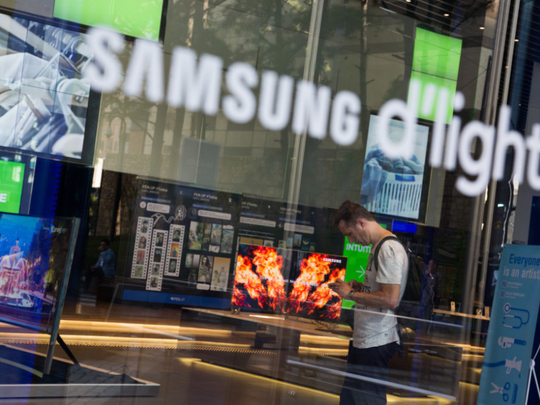
Seoul: Samsung Electronics responded warily Thursday to a proposal by US hedge fund Elliott Management to split the South Korean tech giant into two companies but markets cheered the plan, sending its shares to a record high.
“We will carefully review the shareholders’ proposals,” the technology conglomerate said in a terse one-line statement, with its spokesmen declining any further comment.
Entities controlled by Elliott, the hedge fund run by billionaire Paul Singer, own about 0.62 per cent of Samsung.
In a detailed proposal unveiled on Wednesday, Elliott laid out a strategy for streamlining Samsung, splitting the company in two, dual-listing the resulting operating company on a US exchange and paying shareholders a special dividend of 30 trillion won (Dh9836 billion, $27 billion).
Elliott argued that Samsung, currently a maze of listed and unlisted companies with a notoriously opaque ownership and management structure, had suffered from a long-term undervaluation in the equity market.
The proposal saw Samsung’s share price close the day up 4.45 per cent at an all-time high of close to 1.7 million won.
The market boost came at a difficult time, with Samsung navigating a complex leadership succession while struggling with a global recall of some 2.5 million Galaxy Note 7s after the smartphones were found to have faulty batteries.
Full range of products
Samsung trumpeted the acquisition of a prominent US artificial intelligence (AI) start-up founded by the creators of Siri — the voice-based digital assistant used on arch-rival Apple’s iPhone.
Samsung said the deal to buy California-based Viv Labs would bolster voice-based services across the full range of its electronics products that include TVs, refrigerators and washing machines, as well as smartphones.
But it was the Elliott proposal that really grabbed the market’s attention, and simultaneously reignited a clash between the family-run conglomerate and the activist hedge fund, which unsuccessfully sought to block a merger of two Samsung affiliates last year.
Elliott had challenged Samsung’s plan to have construction firm Samsung C&T taken over by the group’s de facto holding company, Cheil Industries, saying the move wilfully undervalued the C&T share price.
Samsung insisted the plan was critical to its current strategy of streamlining and consolidating its group holdings into fewer, larger companies.
Although Elliott lost the bitterly contested battle, the campaign was seen as a watershed moment for shareholder activism in South Korea, where family-run conglomerates, or “chaebols”, dominate the economy and are used to running their businesses with minimum investor interference.
In an unprecedented show of domestic investor power, more than 3,000 individual shareholders had grouped together in an online forum aimed at blocking the C&T takeover.
Factbox: Samsung in hot water after “new” phone catches fire on plane
A US flight was evacuated prior to take-off when a passenger’s Galaxy Note 7 — reportedly a replacement in Samsung’s global recall — caught fire, landing the company in new controversy. Samsung has been struggling with a recall of 2.5 million Galaxy Note 7 handsets due to complaints of exploding batteries, a problem the replacement phones are supposed to fix. But on Wednesday, a Southwest Airlines flight leaving Louisville, Kentucky was evacuated after a passenger’s new Samsung phone began emitting smoke.
Brian Green, the owner, told tech news website The Verge that the phone was a replacement, which he picked up on September 21. He also provided a picture of its box, which has a black square symbol indicating that it was a replacement.
Some 60 per cent of US consumers had swapped their devices for replacements by the end of last month.












